All Things Fitness With David Spinelli
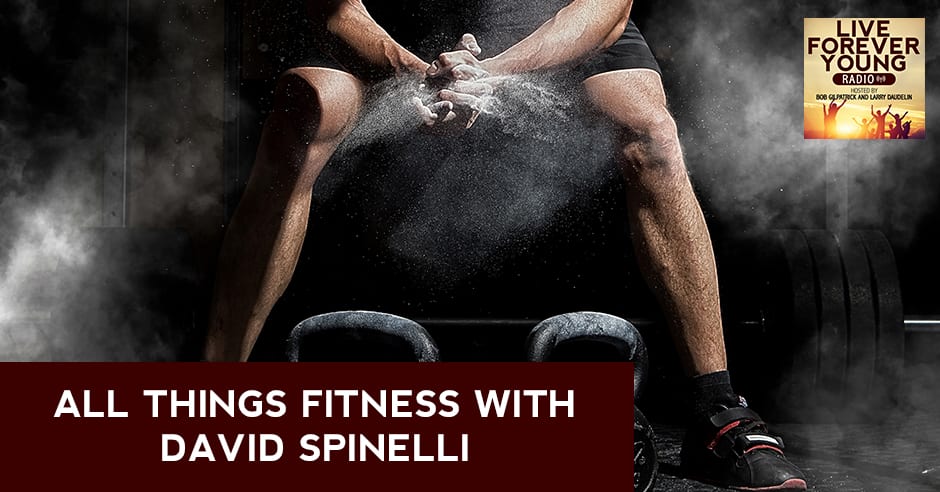
Exercise is great for physical and mental health and has been shown to help alleviate social withdrawal. Today, Fitness and Real Estate Guru David Spinelli stops by the show to talk about All Things Fitness. David's mission is to help everyone, from high-end athletes to individuals recovering from surgery and injury, regain their physical health.
Together with Bob Gilpatrick and Rollie Culp, David discusses the benefits of exercise both physically and mentally. They also share great tips you can use to stay consistent and accountable with your workout routine. If you want to grow stronger and healthier by having a consistent exercise regime, then this episode is for you!
---
Watch the podcast here:
Listen to the podcast here:
[fusebox_track_player url="https://feeds.podetize.com/ep/U2mR2BQBL/media" title="All Things Fitness With David Spinelli" social_linkedin="true" social_pinterest="true" social_email="true" ]
All Things Fitness With David Spinelli
The Importance Of Exercise For Your Health.
I'm here with our special guest, Dave Spinelli. Dave is a Realtor and a Fitness Guru for many years. We're happy to have Dave here in the studio. Dave, welcome. How are you doing?
I'm doing fantastic. It's finally great to be here. I know we've been talking a little bit about getting on the show. Looking forward to it and let's talk some fitness knowledge. Let's get some people in good shape.
Before we do that, welcome, Rollie. Dave, if you could take just a minute, tell us a little bit about yourself, how you got into the world of fitness when you first did, how many years, that kind of thing.
I've been in fitness for my entire life through sports. I played sports, soccer, and football. I continued that aspect. I started working for a few different gym outfits and then I got certified. I started seeing the impacts of how I was helping people and how exciting it was.
From all walks like old, young, different types of health issues, from major problems to high-end athletes. It was such a pleasure to see people expand mentally, but also physically. I got into working for an outfit for quite a few years. I got on my own and doing personal training.
Being certified for a long time, it's started getting more impactful. The knowledge keeps growing and so I could keep helping more people. I love it. I caught the bug and I've always been doing real estate as well. That's where I combined the two. I'm working with busy professionals and realtors alike to get them more fit, all that exercising into their busy days.
You have a Facebook page that's called Fitness 4 Realtors. What's that all about? Is there a place where people come to share or is it you teaching or both? It's an invite-only. It's a free group. We have a Facebook. It's for busy professionals that want to expand their day, career, life, health, and fitness because it all goes together.
We found that once you organize your day properly where you can set time to exercise, the rest of your day seems to follow a line. They become more successful. We're all sharing information and sharing tips. That's where we work out plans. If someone wants to go more in-depth, I can work out a full plan with them and on the mental aspect and the health side of it.
You find that the ability to retain the regiment with the exercise translates very simply into the professional life, the professional aspect of being a realtor or a business person. Once you set your day off right, it seems to follow along and then know people become more organized.
Dave, in general, for physical reasons or biological reasons, what's the importance of exercise for a person who wants to be very healthy and live a long, healthy life?
The importance of exercise, your heart health, your circulation, blood sugar issues. The mental health aspect of it with what we have going on in the world now seems to be one of the larger, impactful issues of being healthy. It translates to increasing your endorphins. It doesn't take much to do that from the mental side of it and avoid depression, which comes along with stress.
Once you start getting stressed, then your body gets a whole host of other health issues from being stressed. That's where it seems to have the biggest impact.
We talked about it a lot on a show we did called Managing Stress and Anxiety During Trying Times. If people want to catch up, that's another show where we go in-depth, but I'm glad we're touching on it more here now. People will hear, "You should do some more exercise." What does that translate to in the opinion of a guru on fitness like yourself? What type of exercise should people be doing?
The real question is the type of exercises that are important, but it's the fact of getting started and getting moving. That makes a huge impact on how the next couple of months are going to go and a couple of years are going to go of your life. If you're getting your body moving, whether it's at home there's a lot of different aspects of bands and kettlebells that people can do that we work with, especially being closed down for as long as we have.
There is cardio through walking, sit-ups, push-ups, pull-ups, a whole host of band exercises you could do for your body in 15 or 20 minutes a day, getting your body moving. Combining that with resistance and cardio. If you're going to go out for a walk, you could walk all day until the cows come home, but it's not going to improve your muscle tissue.
That's where the importance of metabolism comes in. If you're improving your muscle tissue, each pound of muscle burns on average of 25 to 50 calories a day. It improves your circulation and your flexibility by doing resistance training. We try to get into a little bit of resistance training to help the muscle tissue firm, tone and increase metabolism. How do you include resistance training while you're walking?
That's why I say walking wouldn't be the greatest for just resistance. That's good for heart cardio and heart health. Are you separating the two or people can use small weights while they're walking? Using small weights while you're walking, holding them up, doing curls as you're walking. That'll help a lot. I heard if you don't have any weights, some people will fill up water bottles and carry water bottles with them.
Gallon jugs of water, which is 10 to 12 pounds. You could do curls with that and shoulder presses with it. When we first got shut down, I was in my room in the center of my living room and my stool, watching in my mirror, holding gigantic soup cans, hold them out as long as you can. You'd be surprised how it makes your shoulders burn. That makes a huge difference rather than sitting down and a little bit a day to keep your body going. What I stress to most people is get started. Doing fifteen minutes today is more than what you did yesterday.
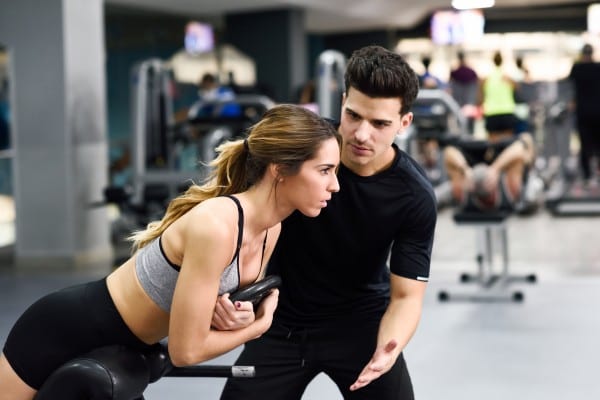
It is with the supplements that people call us about. "What should I start doing?" It's not about getting started. It's about doing it every day too. Once you get started, it turns into a habit and that's where a lot of the keys to success come from.
Dave, in order to get started and continue, some people need to have a personal trainer. Can you talk to us about the world of personal training and why it's become so popular? How does somebody benefit most out of it? If you were going to advise someone, “Here's the best way to work with your personal trainer," What would that be?
That's one of the biggest growing health professions, is personal trainers. Consistency and accountability. That's the main aspect. What I see with busy professionals is they find it easy not to be able to fit in a regimen in 20, 30 minutes a day, where it's impactful enough that it's going to make a difference. When you have someone saying, "Here's what you need to do based on your health background, your flexibility, and what you need to perform these exercises," and then the personal trainers should be held that person accountable.
Tracking that, how you're coming along over a couple of weeks and months and you're getting results. If you're getting results with people and you're not letting them slow down, you not letting them back off, keep the foot on the gas, but knowing where to start. Everybody's a little bit different. If you have a high-end athlete that sat around for a year, you can't start them where they ended up before either.
It's always starting at a point where they're comfortable and you're not doing too much. You don't want to be sore for 5, 6 days. Good personal trainers are going to gauge that where they feel good and they want to come back tomorrow and they're seeing those strides and are feeling better.
When you say come back tomorrow, a lot of that has to do with the speed of recovery time. Being able to recover quickly you can get back into the gym and continue to work. That's one of the things nutritionally that we do that we have with our barley has high amounts of an antioxidant called SOD.
I've told you a little bit about it and you've used it before. One of the things a lot of people say, we have a distance swimmer who's in Hawaii, Dr. Greg Gerber. He says after about a 2.4-mile swim, his recovery time feels like it's less than 5, 10 minutes. That's a good thing to keep in mind, especially when you're starting back from zero. Get something that can help with that recovery time. Take care of yourself too.
The effects of that I've seen or I've recommended my clients on the Boomer Barley have been amazing. I noticed a difference with the energy levels. I put it in my pre-workout and I use it in my shake. The Boomer Boost in the morning. I cut down my coffee intake because of that.
It's surprising. It does make a difference, but you're right, the recovery time with getting rid of oxidants, the stress on your body from what we're getting in through if you're not in the greatest or the environment. If you can get rid of those toxins faster, your body's going to heal much faster. That's one of the other aspects of it. The supplementation is huge.
Dave, you do training here locally in the St. Petersburg, Florida area, but you also have clients that are even in different countries. Can you tell us how that works when you engage with a client who's not physically here with you? Do you use video training? How does that all go?
It's a combination of all those. There's what I do with people in Canada and Europe and they're still shut down. There's a protocol that I have. We go back and forth with what their health, it looks like what their goals are. We talk on the phone. I have a personal app that I could structure a workout for them that they get when they go into the gym with their phone or they're at home with their phone. They could do homework outs from the app that designed by me for them based on what they have. We do a phone call each week where we do a check-in, measurements, and pictures.
That helps with consistency and accountability. It keeps you in that habit, which is the key. It’s cool. Dave, for the people that are here locally or who live nearby, do you meet them at their house or the gym, or a mixture of that? It's a mixture of that. A lot of clients that I have had in person, now because of the COVID, let's just go ahead and do it online. I'll do it at home. "Here's what I have, take a picture of it." They love that aspect of it because they're still getting the accountability. Going into their gym or facility, there is a facility that I have. If they're local at St. Petersburg, they could come to see me. I can take them through full workouts based on what they need.
When you first meet with a client, it sounds like you take some time to figure out their level, their health, nutrition, all that level, and get them a personalized structured thing to follow and make them accountable. It's called the park use. I find out as much information as I can on their health and fitness, what they want to accomplish, how long they have, what the realistic goals are. That’s where I can take them in that direction.
You got to have goals to start with them. Dave, a gentleman showed up here to meet with us at the Boomers Forever Young Nutrition Office. A man that you had encouraged to come and see us and he was recovering from an illness. Let's put it that way. Do you see that a lot where people will come to you who have gotten out of the hospital or they've been in rehab, maybe they got a new diagnosis with something where it's more than just, “I want to get in shape,” but they need help in a more professional way?
There are personal trainers that will specialize in high-end athletes. I like working with those athletes and I certainly can, but I find such a huge benefit of an aging population or people that come out of surgeries. I see such an impact when you're combining health fitness and supplementation. That goes together. I don't know if it's a synergistic effect that the endorphins health, the relieving stress in their body and that a good supplementation program mentally and physically. I see a huge difference.
As opposed to someone who doesn't do the supplementation, maybe a good diet, but not the additional supplementation. Dave, this is the end of the first quarter of 2021. Have you had a lot of people contacting you about how to lose their COVID 15 or 20 extra pounds? In some cases, it's 30 or 40 pounds. What's the average?
It's about twenty pounds from what I've seen. People have a little extra around here and losing it. A lot of that around the waist had to do with stress, the impact that stress has. I'm seeing a lot of the stress relates to depression. Getting them out of that funk and getting them started. Once they get started 3, 4, 5 days, you start revving up, it becomes a lot easier.
There are a few more tricks. You have to deal with the supplementation and relieving stress and how to reduce some of those stress hormones, ghrelin and leptin. That all goes together and you could drop fifteen pounds quickly because it was developed quickly. If you do it right, it's going to go.
You talked about the idea of getting into the right mental state of mind. While you're talking about that, I would assume there's a big mental aspect to fitness. One question I get is how do you keep going? What's a great way to keep yourself going? I know the accountability is good, maybe something like the app that you have that gives you a visual. What is some of the things that you work with where people would say, “This makes it easy for me to continue to work out?”
What I find in a twelve-week program, at about the 5th or 6th week, people start backing off. That initial energy inertia is starting to lose. That's where the plan kicks in. Through daily emails, there's a little bit of accountability that they have to perform. Whether it's, "I have a cup. I have to drink five glasses. I had to measure it with rubber bands and take a picture, send it to the group. Take a picture of your meal today." There's a tea cleanse.
They start at about the sixth week. It gets them back focused again. All of these things for accountability are the mental aspect of it. That's a big deal because you're not going to see humongous results in the first 5 to 6 weeks. They're thinking, "What's happening," but they're feeling it mentally and stronger. They're feeling more fit and that you keep them going after twelve weeks. They're starting to see it.
Dave, you were telling me when we were talking about something you engaged in for yourself, and this came from a book that you read. Can you tell us about that? We're going a little deeper than we thought. I've seen a few and it does get pretty deep, but it's hard for me to talk a little bit about my personal aspect. Tell us about the book and what someone might expect if they were to read this book.
The book is called Love Yourself Like Your Life Depends On It. It's by the author Kamal Ravikant. It all started with COVID and you're being shut down and locked up. What do you do? As opposed to going online, playing video games, I decided to start looking at reading and how I can benefit myself mentally a little bit more further. I started one book a month. That was my goal. I started with this book, Love Yourself. The aspect of this book, Kamal Ravikant was a CEO of a great big company.
He had a fiancé. Life was going great. He lost his company and his fiancé left him. He lost his best friend, who passed away and then he lost his home. He was in bad shape. The book talks about how he recovered from all of this and got back to a functioning life and then way beyond. He gives talks with high end companies and CEOs and colleges. I never meditated before. I never thought it was even worth meditating. I didn't understand it. I would sit quietly and I'm confused. I didn't know how to do it.
This book taught me how to do it. I'll never give it up again because it goes into loving yourself is the most important aspect that you can do to yourself. If you don't love yourself, you can't love anyone else. It's hard to love your life. In the meditation, that's what you're doing. You're talking about loving yourself. God loves you. The world loves you. The universe loves you. As you're saying this over, you tend to believe it and you start to feel it. You're doing your gratitude. As I said, it speaks to you as to how to meditate. For a person that never meditated before, it made a lot of sense. That's where this book picks up.
Dave, the reason I was thinking of this because it seems to me a personal trainer, working with someone to get in shape, lose their COVID fifteen, if they had access to this book and to the exercises to help them to love themselves, they're more likely to be engaged in their exercise, their fitness, their overall health, including their mental health if they could get to this state. That's why I wanted you to mention it. It may be something beneficial for people in the audience.
You find that if you're not exercising, you should be, or you're depressed and not feeling great, you tend not to feel great about yourself or you don't love yourself enough as you should. I've recommended this book to a few of my clients that read it and it changed their complete outlook. They started meditating. It similar to me and they never did it before. I would tell them it's worth it. It's an easy read, go through it.
I'm scratching the surface of it. There are a lot more aspects in it that are very easy to implement that you could do without having to think about it on a daily basis. What are my steps? What do I have to do? It's a lot easier and I'm someone that needs to read it and I can implement it and think about it daily. Whereas these clients that have read it, changed their life around mentally and then physically. They've always had a challenge in exercising. With this different aspect of mental they found in the book, they're a different person altogether.
Dave, thanks for sharing that with us. I'm going to be picking up a copy of that book myself. Rollie, you and I can share the book. I'll read a couple of chapters, pass it over to you. I'm always down for a good book. While you were challenging yourself with your book a month, did you read this and maybe read it once every month or did you keep going on?
I read through it and highlighted each chapter. The next day when I had to go back and read the chapter, I'd read my highlighted portion from the chapter before, and then read it again and then went through and read all the highlights. I read it three times.
Dave, a lot of what people are doing with getting into exercise, especially with a personal trainer. They're developing new habits and there are some gurus in habit management. One of them is Brendon Burchard. We were talking about his High Performance Planner. Rollie, you and I have talked about this once before on the show. We were talking about it on Habits to Help Seize the Day, how to start your day out. It's one of the shows we did and we did go over it, but this would probably be very helpful for exactly what we're talking about with accountability and consistency.
This gives people both a monthly, a month ahead at a glance. It gives them their week ahead with more detail. It has daily planning pages also. What's great about this is it helps you to start in the morning and it asks you to write a message to yourself. Dave, if people were going to use this in conjunction with the book, Love Yourself Your Life Depends On It, this would be a place where they could put a message regarding loving themselves.
There are ten questions to answer in order to set yourself up for your morning mindset. In the middle, you have the actual times of the day broken out by 30 minutes so you can schedule your exercise, communication with your personal trainer, and plan your day this way. Just for example, in the morning mindset, the first question is, "One thing I can get excited about today is." Number three says, "Someone who needs me on my game today is."
Usually, if you ask yourself that question in the morning, they remind you maybe of a particular person who's having a challenge, maybe one of your customers that had surgery, that type of thing. This helps you with your morning mindset. There are two other categories. One says, "The top three goals and priorities." The other one says, "Tasks that must be done today."
This is the part I like. It's called the evening journal. It starts out with, "A moment I appreciated today," and then, "A situation I handled well." There's one that says, "I could have made today even better if I." You're going to answer these six questions. In the end, it's asking you to grade yourself 1 through 5, with 5 being the best on the issues of clarity, energy, necessity, courage, influence, and productivity.
This is a planner that could be helpful for some people. It's like a combination of the mindset from the book we referenced and all the other material about fitness you were talking about. Do you know what I like about this? Brendon Burchard's a phenomenal author. He wrote a few other books, one other I read, but there's also a book called The Miracle Morning, not by Brendon Burchard, but these aspects are in there, how important it is in the morning, and the book by Kamal Ravikant. It's not a book where you have you writing things down.
You could take those philosophies that you're learning, put them in here. You're always remembering them. I've seen this but I haven't used it yet. This is something I thought of not only for myself. Clients staying healthy, fit and keeping a mindset forever. Keep yourself organized, but also set your mindset and then evaluate yourself at the end of the day.
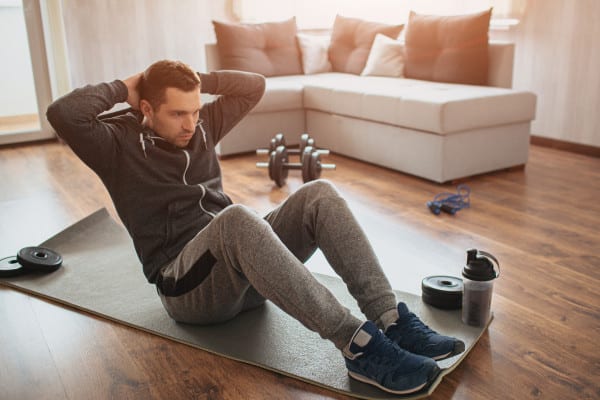
Important Links:
- Dave Spinelli - LinkedIn
- Fitness 4 Realtors - Facebook
- Managing Stress and Anxiety During Trying Times - Past episode
- Boomer Barley
- Boomer Boost
- Love Yourself Like Your Life Depends On It
- High Performance Planner
- Habits to Help Seize the Day - Past episode
- The Miracle Morning
About David Spinelli
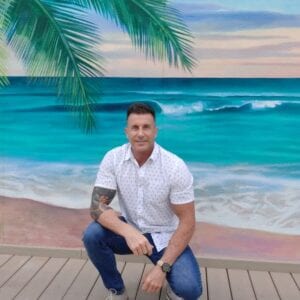
David Spinelli is a former athlete and a certified Health Instructor in the St. Petersburg, Florida area. He is also a Licensed Realtor and is passionate about helping others discover the benefits of exercise and fitness. He has recently started a New Facebook called "Fitness 4 Realtors" and offers 1 on 1 personalized Health and Fitness coaching to everyone, specializing in business people who don't have a lot of time but want to get healthy. He doesn't just stop at exercise, David helps you figure out the right nutrition and even has his own app that can help his clients stay consistent and accountable with their workouts.


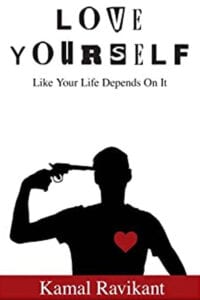

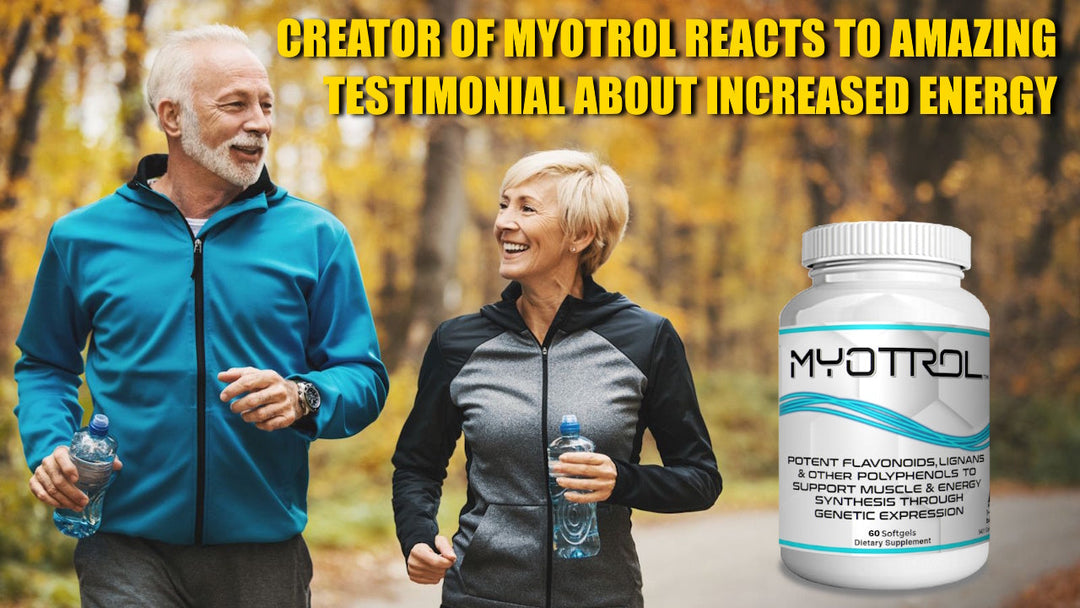
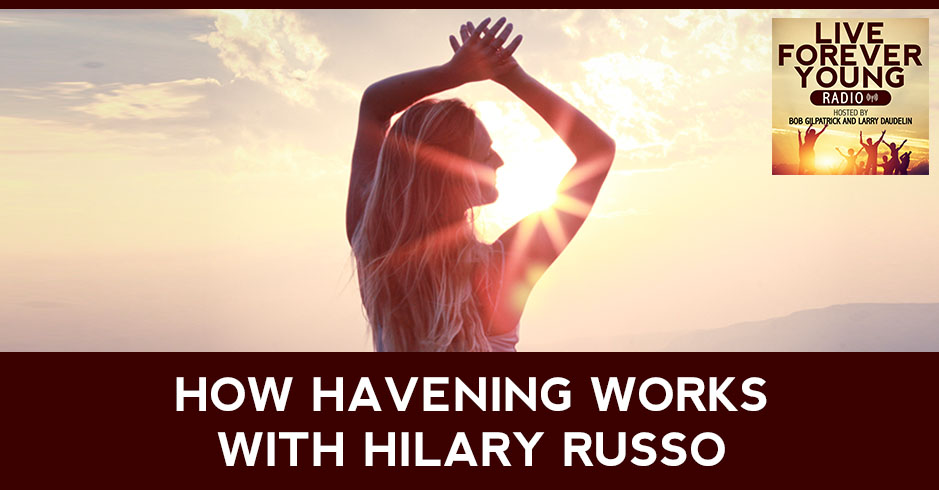
Leave a comment